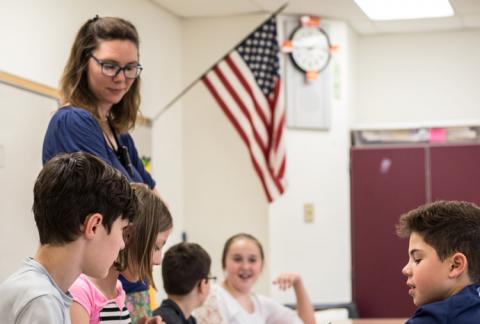Inquiring Minds

Before children enter grade school, much of what they learn springs from curiosity and unstructured play. Once they enter the classroom, however, they often must adapt to rigid lessons and fact memorization, a challenge for students and teachers alike.
With the help of Cooperative Extension's Science Literacy Team, New Hampshire teachers are discovering ways to bring open-ended exploration — and with it, excitement and wide-eyed wonder — into the classroom.
It is called inquiry-based teaching, and Cooperative Extension Youth and Family specialists Sarah Grosvenor, Claes Thelemarck and Lara Gengarelly are promoting this curriculum through an ongoing series of courses for K–12 educators across the state. It was originally developed by the renowned international learning laboratory Exploratorium to show educators how to use inquiry-based teaching methods that encourage discovery through questioning, observing, investigating, testing and discussing results.
That curiosity ripples out from classrooms and into other Extension efforts on STEM education. Inquiry-based teaching, the STEM Docents program, the UNH STEM Discovery Lab in Manchester and a variety of 4-H STEM programs are creating hands-on opportunities that inspire and motivate students.
"I like that the inquiry method allows students to ask and answer their own questions," says Allison Friend-Gray, a fifth-grade science teacher at Dover Middle School in Dover and a workshop attendee. "It helps raise student engagement and interest in science. The first time we did an inquiry, one of my students raised her hand to spontaneously announce she 'loved doing science this way.'"
For Friend-Gray's classroom inquiry project, a requirement of the course, she asked students to observe and formulate questions about pond snails and fish. Moving away from scripted teaching generated enthusiastic responses from her students, whose questions included, "Do fish get lonely?" and "Why do snails use shells as their homes?"
Grosvenor, Thelemarck and Gengarelly are busy offering training that aligns with national recommendations for professional learning to educators. The program is now in its second year. Their most intensive instruction is a seven-week course with hands-on examples that participants say is transforming the learning experience for them and their students.
"Our work is building the New Hampshire workforce of tomorrow," says Gengarelly, Extension associate professor and specialist for science education and outreach. "This teaching approach fosters a way of thinking that prepares students to be successful in science and technology."
This story originally appeared in the 2017 edition of Radius.
